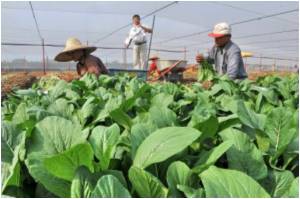
In Australia, debate on the future of agriculture has largely focused on drought and predictions of a hotter, drier climate. Significantly, it has tended to overlook the fact that the world may be entering a prolonged period of shortages and famines parallel to an increased demand for food.
According to Julian Cribb, professor of science at the University of Technology, Sydney there is apathy about a potentially extremely grave problem. Sixty per cent of all conflicts in the last 15 years have had, at their core, a scarcity of food, land or water, he points out.
According to Cribb, refugeeism both internal and international can be put down to a scarcity of food, land and water and the conflicts between the different groups it brings about.
Australia has not yet assimilated that agriculture policy is defense policy. It has refugee policy, immigration policy, environmental policy as well as health, food and economic policy. But no sound food policy “We persist in seeing it as an issue all on its own”, he rues.
The above reasons explain the slashing of agricultural research by governments, State and Federal, by universities and by science agencies at a time when agricultural scientists are retiring and university agriculture science enrolments are collapsing. This phase could actually be a second sort of drought: an agricultural knowledge drought, says Cribb.
Advertisement
The Commonwealth recently announced a $10m top-up for rural research, yet says Cribb , “Fifty times that would be closer to what is needed”.
Advertisement
“Australia has plenty of land where food can be reliably produced around the southern coast, but chooses to put racehorses, golf courses, van parks, resorts and cities on it. If parts of the wheat belt and Murray-Darling Basin have to be returned to pastoralism due to water shortages and climate change, Australia’s total food production will contract, just when that of the world is contracting.
“This is crazy in three respects. First it will make us food insecure (and subject to very high prices) at a time when the whole world is also insecure. Second, we will lose the economic benefit of having a substantial exportable food surplus. And third we will lack the scientific skills to help stabilize other neighbor countries’ food production, leaving us with far more refugees and regional conflicts to deal with ”, Cribb stresses.
Crib laments the fact that no side of politics seems to appreciate the central importance of science to modern agricultural systems, the scale of new knowledge needed to maintain food production in hot, dry times or to open up the North sustainably. “No side seems to fully grasp the role of agricultural know how in preventing conflict, refugeeism and ecological crises in our region”, he points out.
Cribb hands out the clincher of the debate on Australia’s food policies:“Both sides say this election is about the future. If, in the coming weeks, you encounter a politician, ask them about food – and the reply will quickly tell you whether or not they have any grasp of the future”, he challenges.
Source-Medindia
ANN/V





